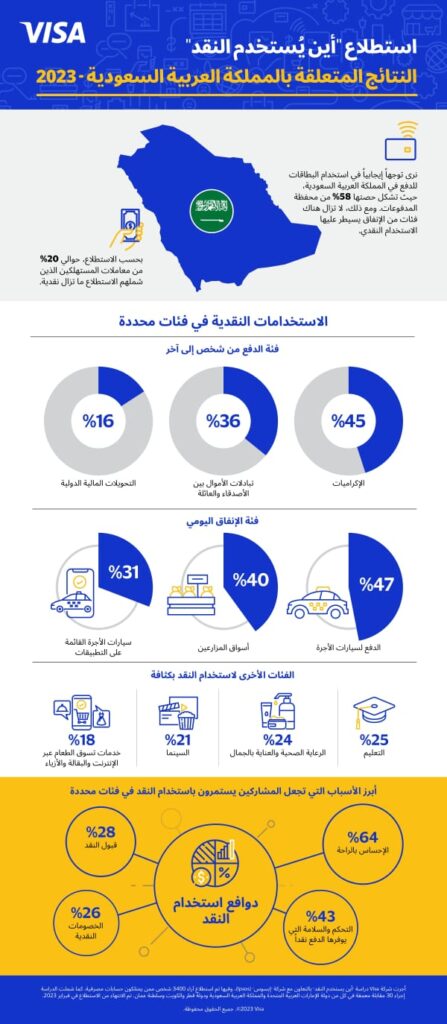Visa ‘Where Cash Hides’ research identifies categories in KSA where consumers still use cash

• According to survey respondents, around 20% of their transactions are still in cash
• Cash is used more often in peer-to-peer (P2P) transactions, tips, and everyday spending; convenience, control and safety are key motivators for using cash in identified categories
• Visa’s Ali Bailoun: Significant opportunity to extend digital economy to more consumers and businesses in the Kingdom
While Saudi Arabia (KSA) is at the forefront of digital payments, around 20% of transactions of consumers surveyed is still in cash, according to Visa’s ‘Where Cash Hides’ research.
The research – based on survey of 3,400 individuals and 30 in-depth interviews across Saudi Arabia, UAE, Kuwait, Oman, and Qatar, included questions about overall frequency of cash usage and specific cases where respondents would use cash more than other payment methods. Based on these results, the report identifies cash-heavy categories and consumer drivers of cash usage and proposes easier, more secure digital payment solutions for both consumers and local businesses.
Key survey findings
Cash in specific transactions:
In KSA, P2P transactions (33%) and everyday spending (29%) form a large portion of cash usage.
• Within the P2P segment, tips (45%), money exchanges between friends and family (36%), and international money transfers (16%) are the prime areas of cash usage.
• Everyday spend like taxi (47%), farmer markets (40%), and app-based taxi (31%) are mostly where cash is used. Other cash-heavy areas include education (25%), healthcare and beauty (24%), cinema (21%) and online food, grocery and fashion (18%).
Motivators for cash usage:
• Respondents’ perception of convenience (64%) was cited as top reason they prefer using cash in the specific cases identified by the research. Other reasons include perception of control and safety (43%), acceptance (28%) and cash discounts (26%).
Implications and solutions:
• The study identifies situational cash usage, notably exchange houses, and farmer markets transactions. Efforts to introduce convenient, fast and easy solutions such as Visa Direct (P2P, tips and other disbursements, and remittances), and Tap to Phone (low-cost acceptance solution for SMBs, freelancers and taxi) will drive digital payments and increase card acceptance.
• Encouraging mobile payments and contactless usage presents a pathway to increase digital payments usage for everyday expenses. This requires education on acceptance and security of digital payments for both banked and unbanked population.
Ali Bailoun, Visa’s Regional General Manager for Saudi Arabia, Bahrain and Oman, commented, “We see a positive trend in card payments in Saudi Arabia, with a 58% wallet share that continues to grow. However, there remains categories of spend where consumers in KSA still use cash. This presents an opportunity to extend the many benefits of digital payments to more consumers, and businesses for a more inclusive digital economy. At Visa, we remain committed to working with the local payments industry – and in line with the KSA government’s cashless agenda – to accelerate the economy’s transformation and make a better payment experience a reality for everyone, everywhere in KSA.”



